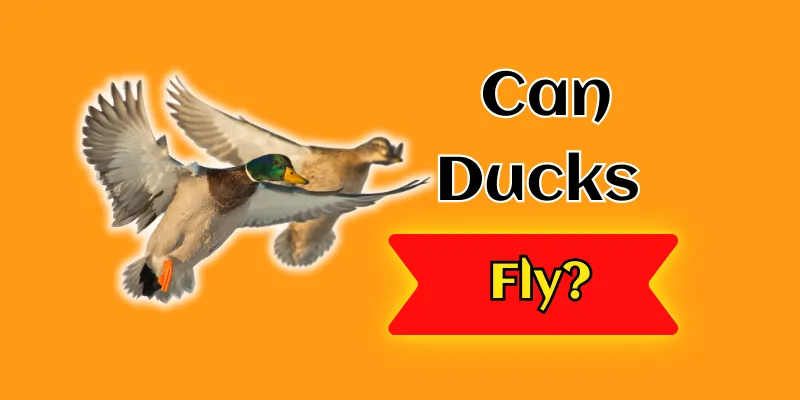Can Ducks Fly? | Top Secrets of Duck Flight
Updated: 21 Aug 2024
98

Have you ever wondered if ducks can fly? Maybe you’ve seen them walking around a pond or lake, flapping their wings as they search for food or try to get away from danger. Or maybe you’ve seen a group of ducks flying together, looking cool as they soar through the air. Whatever the case, the question remains can ducks fly, and if so, how do they do it?
Can Ducks Fly?
The answer is Yes, they can! But not all ducks are created equal when it comes to flying abilities.
In this article, we will explore the differences between wild and domesticated ducks, the factors that affect their flying abilities, and some fascinating facts about these amazing birds.
Wild Ducks A Strong Fliers
Wild ducks are strong flyers and can fly at high speeds, covering long distances. They have strong muscles in their wings, which allow them to fly for long periods.
They are also able to fly at high altitudes, which helps them avoid predators and find food. Some wild ducks can fly as high as 2,000 feet (610 meters) and reach speeds of up to 50 miles per hour (80 kilometers per hour).
Domesticated Ducks Limited Flying Abilities
Domesticated ducks, on the other hand, may not have the same flying abilities as wild ducks. Many domesticated ducks are bred for their meat, eggs, or feathers, and as a result, they may not have the same muscle development in their wings. This means they may not be able to fly at all.
However, just because a duck can’t fly doesn’t mean it can’t get around. Ducks are excellent swimmers and can use their webbed feet to paddle through the water with ease.
Factors Affecting Duck Flight
Several factors affect a duck’s flying abilities, including
- Age
Young ducks or ducklings are not able to fly until they reach a certain age. Their wings are not fully developed, and their muscles are not strong enough to support flight. - Breed
Some ducks, such as mallards(Green) and pintails(Brown), have a migration pattern and fly long distances during certain seasons.
Others, such as Muscovy ducks(Black-and-White), are non-migratory and are not built for long-distance flights. - Weight
Ducks can fly with a significant amount of weight, but their flying abilities may be affected if they are too heavy. - Wing Shape and Size: The shape and size of a duck’s wings are important for flying. Ducks with bigger wings can fly farther, while those with smaller wings are better at quick turns and changes in direction.
Fascinating Facts About Duck Flight
In this section, we’ve collected some amazing facts and answered common questions about duck flight.
How high can a duck fly?
Ducks can fly as high as 2,000 feet (610 meters) and reach speeds of up to 50 miles per hour (80 kilometers per hour).
How far can they fly?
Some ducks can fly long distances, up to 500 miles (800 kilometers) or more, during migration.
How fast can ducks fly?
Ducks can reach speeds of up to 50 miles per hour (80 kilometers per hour) when flying.
How many miles can a duck fly in a day?
The distance a duck can fly in a day depends on the breed and the purpose of the flight. Some ducks can fly up to 100 miles (160 kilometers) or more in a day.
Can a duck fly if it has angel wings?
Unfortunately, ducks do not have angel wings, and their flying abilities are determined by their physical characteristics and breed.
Do ducks fly in groups or alone?
Ducks often fly in groups, known as skeins, which can range from a few birds to hundreds of individuals.
Do ducks fly at night?
Some ducks, such as mallards, may fly at night during migration, while others may not.
Do ducks fly in the rain?
Ducks can fly in light rain, but heavy rain and strong winds may make flying difficult.
Can ducks fly backward?
Ducks are not able to fly backward, but they can make sharp turns and quick changes in direction.
Can baby ducks fly?
Baby ducks, or ducklings, are not able to fly until they reach a certain age, usually around 6-8 weeks old.
Conclusion
In conclusion, ducks can fly. While not all ducks can fly, those that do can cover long distances and reach high speeds. Whether it’s for migration, hunting, or escaping predators, ducks have adapted to survive in their environments. So next time you’re near a pond or lake, Watch ducks and be amazed by how well they can fly. Also, read one more interesting why do ducks vibrate?
Please Write Your Comments